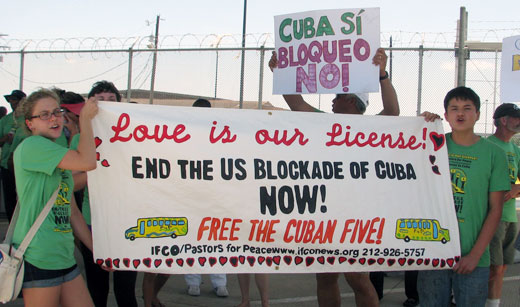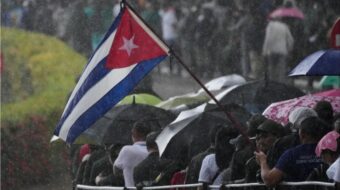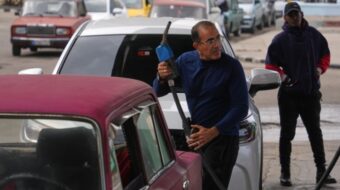
A year of work for organizers, and a month on the road for many participants, culminated on August 1 when the 22nd Pastors for Peace Friendshipment Caravan returned from Cuba, passing that day from Mexico into Texas.
Delegation members are people who uniformly oppose the half-century old U. S. economic blockade against Cuba. The Friendshipment travelers, 108 of them in all, had defied U.S. embargo regulations by taking humanitarian aid to Cuba and visiting the island, doing both of these things without U.S. government permission. At the U.S. border on their return, participants refused to answer questions from U.S. officials about details of their stay in Cuba.
Ellen Bernstein, acting co-director of the Interreligious Foundation for Community Organization (IFCO), the Pastors for Peace parent group, issued a press release as the group crossed into U.S. territory: “With this project, we are enacting a ‘people-to-people’ foreign policy that is based on mutual respect and solidarity. We will continue reaching out to our Cuban sisters and brothers, without asking permission from the US government; and we will continue working to build the better world that we know is possible.”
IFCO, based in New York City, has undertaken dozens of projects since 1967, all aimed at racial, social, and/or economic justice.
Cuba solidarity activists had joined the Friendshipment from all parts of the United States and from several foreign countries. Most of them started out in buses or other vehicles and followed 13 routes in the United States to a rendezvous in McAllen, Texas.
After further preparations, including instructions regarding civil disobedience, they then crossed the U.S.-Mexico border at McAllen, and went on to Cuba via Mexico. During eight days of educational and solidarity activities in Cuba, they visited organic gardens, health centers, urban and rural communities, and schools. They met with a variety of Cuban political, educational, and religious leaders.
The Friendshipment this year was dedicated to the young people of Cuba. On her return to Maine, Maria Sanchez said that, for her, the Friendshipment had been a “life-changing experience.” In Cuba she had seen that indeed, “there was a better way.”
The Friendshipment visitors were on hand to for the graduation exercises of the Latin American School of Medicine. They witnessed 40 students from the United States who gain medical degrees after having completed a six-year course of study. Since graduating its first class in 2005, the school has created 8,600 new doctors from 54 countries. At the ceremony, Ellen Bernstein pointed out that, “the Cuban people’s generosity is great because in spite of the U.S. economic, financial and commercial blockade, its attitude is revolutionary and demonstrates pure love.”
IFCO is in charge of recruiting U.S. students for the medical school and helping them adjust to the requirements of study there. The Cuban government provides all students with full scholarships.
The Friendshipment Caravan this year was dedicated to the memory and work of Rev. Lucius Walker, the founder and former director of IFCO, who died in 2010.
On their last full day in Cuba, the Pastors for Peace delegation attended a ceremony at the Jose Marti Memorial in Havana. There, Rev. Raul Suarez received the ashes of Rev. Walker in order to arrange for their custody at the Martin Luther King Center in Havana, which Suarez founded and led.
Participating in the event were Vice President of the Council of State Esteban Lazo, Cuban Parliament President Ricardo Alarcón, and the president of the Cuban Friendship Institute, Kenia Serrano. The latter expressed gratitude for the hundreds of tons of humanitarian aid brought to Cuba since 1992 by the Friendshipment caravans. She affirmed, however, “the greatest shipment brought by the caravans is the sincere solidarity and friendship.”
Photo: Pastors for Peace










